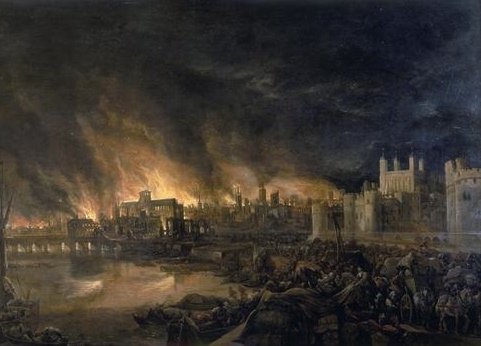Astrology and Burning Cities May 7, 2013
Author: Beach Combing | in : Modern , trackbackAstrology was the one portion of occultism that survived, with its respectability intact, into the modern age. Indeed, up until, the eighteenth century there were those who insisted that astrology should be included among the natural sciences. Then, with the Enlightenment and the birth of modern astronomy, astrology took a dive in prestige from which it never really recovered. However, let’s forget the ladies in tents with crystals and the depressing astrology columns in newspapers and head back to that golden age when elite astrologers believed themselves to be Newtons and Galileos, pioneers of knowledge. The combination of science, pseudo-science and star calculations was almost always a heady one. Beach’s favourite example of this is the English astrologer’s Francis Bernard’s attempt to take the readings not of people but of cities…
Francis was a high-flier in London society. He was personal physician to James II and was clearly an intelligent man. It was that intelligence that led him to overreach himself. In 1664 FB outlined a theory of cities and star signs. Bernard believed, he stated, in a letter, that horoscopes could be cast for cities as for people. So far, so strange, but let it pass, for things are about to get wilder. Bernard noted that the big problem with casting a horoscope for a city was that it was necessary to know the city’s moment of birth. Now with cities this was normally impossible for the founding stone had been laid in the distant, distant past. Here Bernard’s bizarre genius emerges. If the nativity was not available, then, it was necessary to work backwards, reconstructing the nativity through a city’s fires, which were, he believed, the fevers of cities. Bernard had listed every major fire in London’s medieval and modern history (from 1212) and had used this to reconstruct a nativity for the city and from there a horoscope: Beach has not the slightest idea how fevers and birth can be tied together, but anyway… Bernard was confident that he could not only announce what London’s star sign was, but also that he could predict when the next fire would come. ‘Time only’, he wrote modestly, ‘will show us whether we may direct the fate of cities as of men.’ Now anyone who has ever spent any time with early modern astrological charts will know that Bernard is being unduly sanguine about his and his colleagues’ success with humans. But nevermind such details. Bernard announced that he was already considering writing up Amsterdam’s chart… A Virgo if ever I’ve seen one.
Any other astrological madness: drbeachcombing AT yahoo DOT com
31 May 2013: Nathaniel writes ‘Up until the late 1600s astrology and astronomy were the same thing. IIRC it was in 1670 that the French royal astronomer was officially prohibited from casting horoscopes. Newton himself spent more time on the occult than on what we would now call science. Astrology is the poor relation that the millionaire astronomy doesn’t want to admit any connection to. Then the Count. Actually it’s not so silly to cast horoscopes for cities. Back in its infancy, when astrology was a brand new thing invented by some of the early Middle Eastern civilizations, it was taken for granted that one set of stars can’t possibly rearrange themselves to reflect the lives of every single human being all at once. And why would they bother to do this just to shed light on the potential marriage prospects of some random guy who weaves baskets in Baghdad? Individual horoscopes were cast only for kings, because it was clearly absurd to imagine that the Heavens would mirror the destiny of anyone who wasn’t in a position to influence the course of history. You may recall that the BIble contains a story – almost certainly a late and extremely generic addition, but hey, it’s in the Bible so it must be true! – about three Middle Eastern astrologers who, observing a very impressive comet (or whatever), automatically assume that it heralds the birth of a great king who will have a vast influence on the world. And when the comet mysteriously leads them to a complete nobody born in a shed, they take it as read that the Heavens cannot lie and bow down to him anyway. However true this tale may or may not be, it reflects the early view of astrology. Horoscopes were cast for a handful of VIPs, entire civilizations, and, yes, cities. But never for Joe Soap the Baghdad basket-weaver! The idea that astrology applies to absolutely everybody was invented by the Greeks, for reasons which are lost in the mists of time, but which I suspect may have been not unconnected with marketing. But the idea that astrology was more valid for royalty lasted a surprisingly long time. There’s an insignificant star which briefly became very prominent, thanks to a supernova before they understood the concept, which was (and still is) named Cor Caroli in honor of Charles II, because its sudden appearance clearly indicated that God approved of the restoration of the English monarchy. Thanks Nathaniel and Count!



